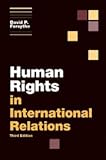Human rights in international relations / [Book] / David P. Forsythe.
Material type: TextSeries: Themes in international relationsPublication details: New York : New York : Cambridge University Press, 2012.Edition: 3rd edDescription: xiv, 355 p. ; 23 cmISBN:
TextSeries: Themes in international relationsPublication details: New York : New York : Cambridge University Press, 2012.Edition: 3rd edDescription: xiv, 355 p. ; 23 cmISBN: - 9781107015678 (hbk.)
- 1107015677 (hbk.)
- 9781107629844 (pbk.)
- 1107629845 (pbk.)
- 341.48 23
- 341.48
| Item type | Current library | Call number | Status | Date due | Barcode | Item holds |
|---|---|---|---|---|---|---|
 Books
Books
|
Junaid Zaidi Library, COMSATS University Islamabad Ground Floor | 341.48 FOR-H (Browse shelf(Opens below)) | Available | 52439 |
Browsing Junaid Zaidi Library, COMSATS University Islamabad shelves, Shelving location: Ground Floor Close shelf browser (Hides shelf browser)

|

|

|

|

|

|

|
||
| 341.242226 NUG-E The European Commission / | 341.247 MUN-E UNIX network programming the stockets networking api volume 1 / | 341.442095491 HAI-R Rivers divided : Indus Basin waters in the making of India and Pakistan / | 341.48 FOR-H Human rights in international relations / | 341.48 SHA-I International human rights / | 341.582 TZA-D Adair on Leadership | 341.584 BAR-B Blinded by humanity : inside the UN's humanitarian operations / |
This new textbook provides an introduction to human rights in international relations at the turn of the twenty-first century. The book examines the policy-making process that establishes and tries to apply human rights norms through the United Nations, regional organizations, state foreign policy, human rights groups, and transnational corporations. Four themes permeate the book: that human rights are here to stay in international relations, that state sovereignty is being transformed by the human rights discourse, that the ‘soft’ law of diplomacy is as important as the ‘hard’ law of court judgments, and that private actors are highly important in international human rights developments. The book documents the many changes in international human rights during the past half-century, and considers the future of universal human rights. Containing chapter-by-chapter guides to further reading and discussion questions, this book will be of interest to all undergraduate and graduate students of human rights, and their teachers. .
All.


There are no comments on this title.